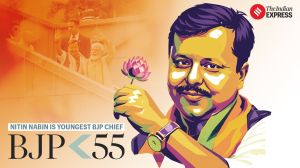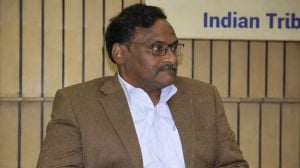How the north was lost
Congress8217;s organisational lethargy stops it from even dreaming of a revival

We do not know if Sonia Gandhi reads Shakespeare. If she does, that evocative line from Hamlet 8212; 8220;when sorrows come, they come not single spies but in battalions8221; 8212; must surely be reverberating in her mind today.
This year has not started off well for the Grand Old Party. And each week brings a fresh instalment of bad tidings. The Congress failed to win the municipal elections in Maharashtra and delivered the prized Brihanmumbai Municipal Corporation to the Shiv Sena-BJP combine, which was widely regarded as a force on the decline. The party leadership needlessly indulged in a bruising battle with the Left and revived memories of its past autocratic leanings by publicly toying with the constitutionally dodgy and politically suspect idea of imposing President8217;s rule in UP 8212; before abandoning the option with no clear explanation as to why it had so sloppily embarked on the misadventure in the first place. Then, just as the political class was preparing to get down to some substantive business in the budget session before fanning out to the mother of all battlegrounds in Uttar Pradesh, the Q bomb has returned with all its fury 8212; much to the unconcealed glee of a suddenly resurgent BJP and acute embarrassment for the Congress party and its First Family.
And the battalions of sorrows 8212; the latest to arrive from Punjab and Uttarakhand 8212; show no signs of retreating. Congressmen can take some comfort from the prospects of cobbling together a government in distant Manipur, but that is hardly much consolation for a party that has been driven out of power in almost all of northern India. Barring the small states of Haryana and Himachal and the smaller entity called Delhi and a dubious independent-led regime in Jharkhand, the Congress has lost its ruling party status across north, west and central India 8212; and with Karnataka gone, it has only Andhra Pradesh to provide a modicum of southern comfort.
Punjab and Uttarakhand may be regarded as marginal states in the larger scheme of things, but the Congress8217;s defeat is all the more glaring because 8212; unlike say UP or Bihar where the party has been steadily declining over the past several years 8212; there were good reasons to hope for a good result.
Although Uttarakhand was carved out of UP less than a decade ago, the Congress organisation in the hills has been far more vibrant than in the dusty Indo-Gangetic plains. In Punjab too, the Congress has a sound base which, dormant during the years of militancy, managed to revive itself quite handsomely. And on the 8216;development8217; front, both N.D. Tiwari and Captain Amarinder Singh, even critics concede, did a great deal in terms of setting up SEZs, industries, and creating employment opportunities. The old 8216;bijli sadak paani8217; did not play much of a role in either poll.
Congress poll managers are already trotting out the standard excuses to explain the twin defeats 8212; anti-incumbency, the alienation of the 8216;aam aadmi8217; due to the Centre8217;s inflationary policies, the 8220;arrogance8221; of Amarinder Singh and the 8220;old-style politics of patronage8221; that marked Tiwari8217;s 8216;lal batti raj8217;.
These factors certainly played a role. In Uttarakhand, where prices of essential commodities always get amplified because of transport costs from the plains, the steep inflation over the last couple of months laid the ground for discontent that the BJP-RSS combine8217;s sustained grassroots campaign skilfully exploited. The rampant infighting between the Harish Rawat and N.D. Tiwari camps in the state and Amarinder Singh8217;s undemocratic ways of functioning also contributed their bit to the defeat.
But all these factors, which make for good excuses in the routine post-mortems that follow an electoral defeat, are not an end in themselves 8212; they are symptoms of a much deeper malaise that the Congress leadership has failed to address since its unexpected victory in the 2004 general elections.
And the central facet of that malaise is the continuing mismatch between governance and politics. When Sonia Gandhi appointed Manmohan Singh prime minister almost three years ago, the general feeling was that the division of responsibilities was the best thing to happen to the party. The Congress had marginally improved its tally in the Lok Sabha, but 145 seats did not exactly spell a revival. The Congress managed to displace the NDA, as we all know, only because it succeeded in winning some crucial allies and secured the support of the Left, which managed to win a record number of seats 8212; unlikely to be matched again 8212; in 2004.
But having come to power, and with Sonia Gandhi free to devote herself to party-building, there was great hope that the Congress would lift itself out of the lethargy and disarray that it had sunk into. Unfortunately, Sonia Gandhi and the Congress leadership have failed to do any such thing. The party8217;s interventions have largely been in the field of governance 8212; prodding the PM8217;s team to set aside funds for flagship 8216;aam aadmi8217; projects such as Bharat Nirman, National Rural Employment Guarantee Scheme, National Rural Health Mission, Jawaharlal Nehru Urban Renewal Mission, and soon to be announced minority welfare schemes.
But the fruits of this 8216;inclusive8217; approach 8212; which is meant to demarcate the UPA8217;s economic policies from the NDA8217;s 8212; simply cannot accrue to the Congress unless there is a party machinery to serve as an interface between the people and the government. Amarinder Singh has already begun blaming the Central government for his defeat, and the 8216;government versus party8217; argument is likely to gain ground in the coming days.
But the party should look within. There was a time when party leaders 8212; from Indira Gandhi down to district level functionaries 8212; met hundreds of party workers on a daily basis, kept alive communication channels with dissidents and adversaries, and translated government policies and slogans to reap benefit for the party. Over the years the Congress worker became more and more dependent on the charisma of the Gandhi family to deliver them at the hustings, and lost the appetite and stamina for the kind of quotidian struggles that are the life-blood of a political party.
But the days of the charismatic leader who could single-handedly win elections are long over. The polity has fractured, loyalties have become ephemeral and people who used to vote for the Congress in election after election will no longer do so merely out of habit. With just about two years left for the next general elections, the Congress must realise that democracy is a daily plebiscite in which the political party more than the government plays a central role. And Sonia Gandhi would do well to spend a little more time at 24 Akbar Road instead of focusing all her energies on fine-tuning government policy.
- 01
- 02
- 03
- 04
- 05































